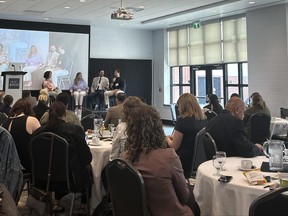Becky Prime didn’t just launch a food business. She bet her life insurance, RRSPs and her reputation on brone broth hot chocolate.

Article content
Becky Prime didn’t just launch a food business. She bet her life insurance, RRSPs and her reputation on brone broth hot chocolate.
“Everybody thought I was crazy,” the founder of Beck’s Broth told attendees at the first-ever Southwest Food Innovation Summit on Tuesday.
But on stage at The Grove at Western Fair, surrounded by other food-sector founders, she wasn’t alone.
Advertisement 2
Article content
More than 150 food entrepreneurs, researchers and government partners gathered for the day-long conference, which was hosted by the London Economic Development Corporation along with The Grove, an agri-business hub, and Fanshawe College’s Centre for Research and Innovation.
The conference, focused on the future of the region’s food and beverage industry, offered a clear message: London’s food sector, which employs more than 7,000 people across roughly 90 companies, is becoming a regional economic pillar. But to keep growing, it must adapt.
Keynote speaker Andreas Düss, CEO of 6 Seeds Consulting, told attendees artificial intelligence’s real value isn’t replacing humans – it’s helping them scale what they do best.
“Your humanity is your biggest asset. . . . Find ways to support it. If you are responsible for other people, find ways to support their humanity, too,” Düss said.
Article content
Advertisement 3
Article content
Duss explained food entrepreneurs are driven by “meaning making” – the emotional stories behind why a product exists. Whether it’s a pierogi recipe from grandma or a snack created for a child with allergies, that human story is irreplaceable, he said.
AI, he said, excels at “sense making,” also known as pattern recognition and data analysis. When used together, they can create significant opportunities.
Marsha Drucker from the Canadian Food Innovation Network noted the push to highlight local ingredients is gaining momentum, especially in Southwestern Ontario, a region known for its agriculture.
In another panel, local entrepreneurs shared how they built their brands from the ground up. That included Matt Swann of Coppa Inc., a London-based frozen dessert company. He said start-ups can’t afford to isolate themselves.
Advertisement 4
Article content
“If you try to do it as an island, you’re going to get hurt. You’ve got to reach out to people.”
Swann recalled a risky marketing campaign: Giving away 1,000 cups of free gelato at a grocery store opening. “It didn’t look good on paper originally,” he said. “But it ended up being probably the best decision we made for that client and further developed the relationship. We’re a trusted supplier now.”
Attendees were also invited Tuesday to tour Fanshawe College’s newly launched Packaging Advancement Centre, designed to help small food startups explore packaging options and run small-batch tests to check quality and shelf life.
Read More
Article content



